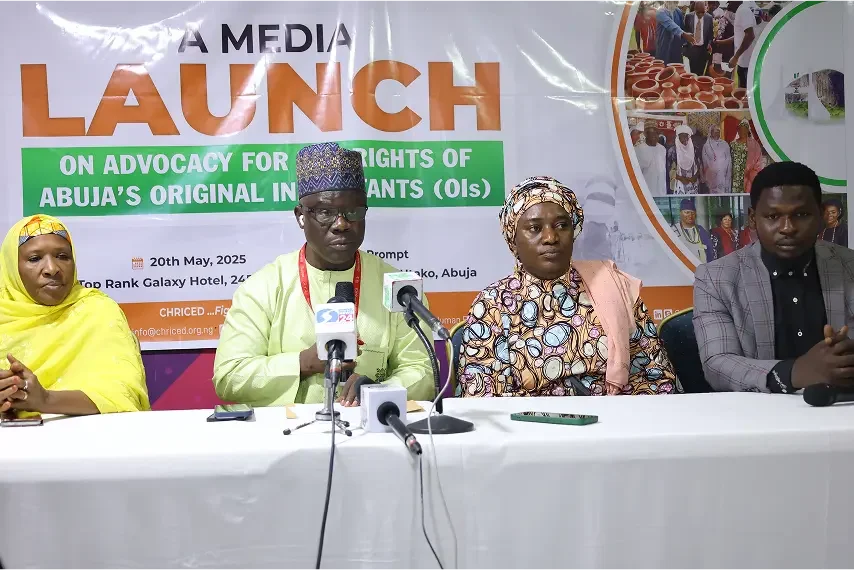The Resource Centre for Human Rights & Civic Education (CHRICED) has launched a new phase of its project to institutionalize the identity, knowledge, and legacy of the Original Inhabitants (OIs) of Nigeria’s Federal Capital Territory (FCT), Abuja.
The initiative, which was unveiled at a press briefing on Tuesday in Abuja, is supported by the John D. and Catherine T. MacArthur Foundation.
Speaking at the event, the Executive Director of CHRICED, Comrade Dr. Ibrahim M. Zikirullahi, described the new phase as a transformative two-year intervention aimed at promoting the political, economic, and cultural rights of Abuja’s indigenous communities.
He noted that the project builds on the successes of the previous phase, which supported 10 OI-led organizations to strengthen traditional institutions, promote cultural heritage, and enhance grassroots advocacy.
“This intervention represents a significant milestone in our collective pursuit of equity, inclusion, justice, and dignity for the Original Inhabitants of the FCT,” Zikirullahi said.
According to him, the previous phase resulted in several milestones, including the appointment of an Original Inhabitant as a minister in Nigeria’s Federal Executive Council for the first time in history, along with other key government positions for FCT natives.
The exemption of the FCT from the Treasury Single Account (TSA) has also opened up financial resources for local development, while the creation of the FCT Civil Service Commission has provided a platform for career growth within the territory’s bureaucracy.
Despite these gains, Zikirullahi stressed that unresolved injustices persist. He recalled that prior to the declaration of Abuja as Nigeria’s capital in 1976, the area was home to nine indigenous tribes.
However, the relocation of the capital led to the forced displacement of these communities, the destruction of their lands, and the erosion of their cultural identity. He condemned the characterization of the area as “virgin land,” which he said falsely implied that the territory was uninhabited.
“The exclusion of Abuja’s Original Inhabitants from governance contradicts the principles of federalism and justice,” he said. “The FCT is governed by an appointed minister, not an elected governor, which denies its residents and natives a voice in their own affairs.”
According to him, the new phase of the project will provide technical training, mentorship, and funding support to nine OI-led organizations to strengthen their capacity for advocacy and human rights documentation. It will also promote the inclusion of women, youth, and persons with disabilities in decision-making processes within their communities.
Zikirullahi also reiterated a major highlight of the initiative to establish the Abuja Native Heritage Centre, which will serve as a hub for preserving the history, language, arts, and culture of Abuja’s 17 indigenous chiefdoms.
“The centre will also support academic research, offer postgraduate scholarships to OI women and girls, and promote indigenous knowledge systems.”
He called on the Federal Government and the National Assembly to amend constitutional provisions that leave Abuja’s original inhabitants politically marginalized.
He also urged the FCT Administration to stop demolitions and land seizures in indigenous communities and to invest in infrastructure, education, clean water, and healthcare.
“We urge our communities to unite, resist political deceit, and continue the legitimate struggle for self-determination and justice,” Zikirullahi said.
A cross section of the participants including, Civil Society Organisations (CSOs), members of People With Disabilities (PWDs) and other social groups applauded CHRICED for its kind gesture towards amplifying the plights of the Abuja’s Original Inhabitants.

